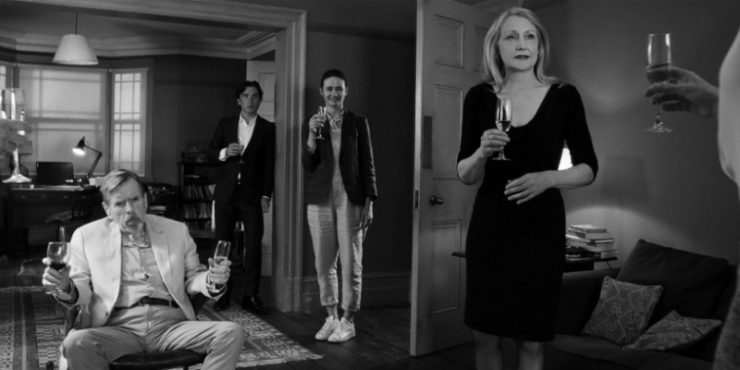Sally Potter’s The Party is a political film. Or, at least, it’s a film about how everything in our lives has become political or, if you prefer, how politics is in everything we consume and love and experience. The entire film – just a little over an hour long – takes place in a small English apartment, celebrating the parliamentary ascension of Janet (Kristin Scott Thomas), who has just been named UK’s latest Minister of Health. At the party is, of course, her husband Bill (Timothy Spall, in a performance that is quiet and austere until the exact moment that it’s not), as well Janet’s friend April (Patricia Clarkson), and her husband Gottfried (Bruno Ganz) who are in the process of separating. Bill’s college friend Martha (Cherry Jones) is also there, with her much-younger partner Jinny (Emily Mortimer) who just learned she’s pregnant. Lastly, there’s Tom (Cillian Murphy), a well-dressed finance man who came to the party with two things: cocaine and a handgun.
In the vain of Albee’s Who’s Afraid of Virginia Woolf? and other claustrophobic ensemble dramas, everything descends into chaotic emotions and revelations of long-held secrets that should have stayed just that, secret. Janet’s newly gained position is the specter hanging above the entire film’s events, influencing turns of events and turning repressions into needs for action. The group’s complicated connections – there’s friendship, marriage, oncoming parentage – implode upon each other in a night that becomes emotionally and physically violent. Potter and cinematographer Aleksei Rodionov shoot the movie in a black and white that becomes harsher as the characters’ behavior escalates. Potter has spent decades crafting truly memorable displays of human behavior, and The Party is her one-act opus, a distillation of the humor and sadness that has made her stories so worth watching.
One needs only to look at the names in the cast to know that it is phenomenally acted. Scott Thomas, as the film’s straight, shows a striking range of emotions, while Clarkson does something she’s often done well before: sarcasm and cynicism as ferocious as a hurricane. Ganz plays a well-meaning, docile man who unfortunately participates in useless babble and the spouting of spiritual platitudes, while Spall’s deadened husband seems like a comatose cadaver before revealing himself to be a time bomb. Jones and Mortimer play out their own relationship drama within the film’s larger story to great feeling and effect, while Murphy’s erratic wild card turns out to be even more of a surprise than you’d expect. This is the best ensemble satire since 2009’s In The Loop, though The Party is much more character-oriented and much more precisely acted. This will likely end up being one of the best movies of the year.
Written and Directed by Sally Potter










